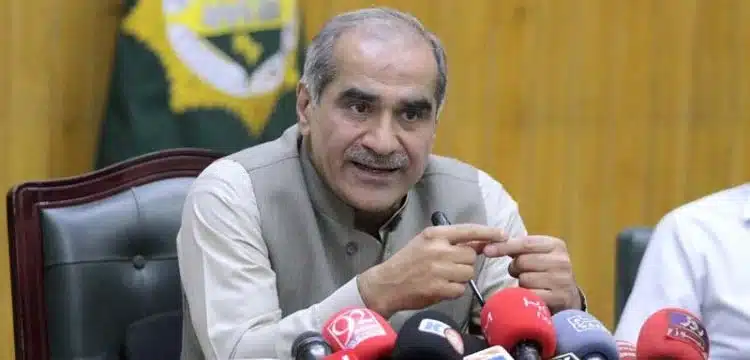[vc_row][vc_column][vc_column_text dp_text_size=”size-4″]LAHORE: Railways and Aviation Minister Khawaja Saad Rafique has claimed that sabotage or a mechanical malfunction in the Hazara Express accident cannot be ruled out.
The federal government’s railway inspector has been tasked to investigate the Sunday catastrophe, which resulted in dozens of injuries.
Meanwhile, the Karachi-bound Khyber Mail was involved in an accident near Bahawalpur (Samasatta) as the rescue operation at the Hazara Express site was proceeding. The locomotive and half of the cars were separated. The driver immediately halted the train and, with the assistance of the crew, rejoined the disconnected section to the remainder of the train.
According to official authorities at Pakistan Railways, the derailment of the Havailian-bound Hazara Express was caused by a broken railway line, hot axle, which obstructed movement.
Officials investigate material failure as Saad refers to track ‘fit’
“I’ve had a bad feeling since this morning.” And then this occurred. “The possibility of sabotage, mechanical failure, or anything else cannot be ruled out,” Mr Rafique told reporters at a news conference on Sunday, and subsequently in a video message with senior railway authorities. “But we can’t confirm it right now until we know whether or not it was caused by a technical fault, sabotage, or accident,” he continued.
The minister described the railway track as fit, with no engineering restrictions (such as speed limits). “At the time of the derailment, the driver stated that the speed was 50 kilometres per hour.” “We’re looking into it,” he said.
Also Read: Shamoon Abbasi Injured in Car Accident, Prayers Requested
Mr Rafique stated that the entire Up/Down traffic on the Main Line-1 was suspended following the accident and thanked the Pakistan Army, Pakistan Railways, various district administrations, and Rescue 1122 for their efforts.
Train operations on Main Line-1 were paused following the incident, while other trains were held at important stations to care for passengers. Rescue and relief efforts were coordinated with the Pakistan Army, Rangers, and local authorities. The incident was investigated at the accident scene by the federal government inspector for railroads and other railway personnel.
Concerns about track safety remain.
Official sources, on the other hand, believe the accident was caused by a broken line at a specific section of the track, a hot axle, or other technical concerns. “The manner in which the passenger coaches derailed and overturned one after the other clearly reflects hitting the wheels with a track spot that was either weak, cracked, or broken and unable to bear the load.” Another possibility is that the heated axle blocked the wheels (trolleys), detaching the chassis from the massive steel body of the coaches,” an official source said.
When questioned how the disaster occurred because the length of track was designed for 105km/h speeds, he stated that the accident might have occurred for any reason. “In railway accidents, three factors are always measured, gauged, or assessed: material failure, system failure, or human failure.” However, it appears that the accident in this case was caused by material failure — queue breaking or tram jamming. “However, there is no evidence of human or system failure because both remained intact and functioning normally,” he explained. In response to a question, he stated that the idea of sabotage cannot be ruled out. “People will learn about the true causes of the accident soon,” he continued.
The Khanpur-Kotri-Khanpur portion of Main Line-1 has been in disrepair for a long time, resulting in numerous tragic and non-fatal incidents, notably in the previous five years. To avoid additional loss of life and property, the PR asked Rs30 billion in 2021 for total track reconstruction between Khanpur and Kotri. However, both the PTI-led and PDM-led federal governments delayed permission, citing the ML-1 project under the China-Pakistan Economic Corridor as superfluous.
“The situation is very disappointing because the Rs30bn PC-1 meant for rehabilitation of the 470km track from Khanpur to Kotri — a stretch that has seen the majority of fatal and non-fatal accidents, especially in the last four to five years — has yet to be approved,” said an official.
The PR intends to replace 15km to 25km of crucial segments of the 470km Khanpur-Kotri route with new tracks. The upkeep of less risky areas is also provided. Due to delays in the approval of the ML-1 project, PR opted to pay and partner with the federal government for independent repair, with the goal of preventing accidents on the notorious “Khooni” line in the Sukkur and Karachi divisions. The route has been the site of numerous incidents, resulting in fatalities, injuries, and damage to railway infrastructure. The official bemoaned the lack of attention from rulers to preserve lives.[/vc_column_text][/vc_column][/vc_row]











